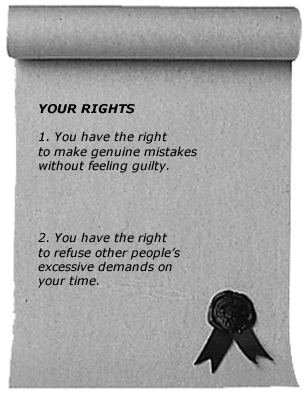Although events cannot always be controlled, your reactions to them
can be. Learning to respond in a balanced, appropriate fashion to events at
work is a key skill in fighting stress. A bad day at the office is just that;
it is not life-threatening.
Modifying behaviour
Behavioural patterns deeply embedded in our subconscious often
surface in times of stress, even if they are not appropriate for work. For
example, if a situation at work makes you feel uncomfortable and you do not
take action to change it, you may find that resentment builds up and is
reflected in your behaviour – you may become angry and intolerant of
other people. Learn to find inner balance and overcome inappropriate behaviour
by analyzing any feelings of unfairness, and trying to discover and deal with
the root of the problem.
Setting your standards
A common cause of stress is feeling guilty about doing or not doing
something at work. Remember, no one is perfect, so do not ask too much of
yourself. If you have very high standards and expectations, it can be difficult
to accept that you have made a mistake. Try to regard mistakes as a part of a
learning curve – analyze what went wrong, correct the error, and avoid
repeating it. Similarly, it can be difficult to refuse work, even when the
request is unreasonable. For this reason, it is important to learn to say
“no” graciously. To lead a balanced life at work, you need to
establish your own priorities, standards, and rights, and be willing to take
responsibility for your own actions.

Handling anger
Gaining inner balance has much to do with controlling anger. Anger
is a disabling emotion that produces measurable physical sensations, such as an
increase in pulse rate and a rise in blood pressure. An explosion of anger may
make you feel better briefly, but it will disguise the real problem by becoming
an issue in itself. If you explode unreasonably at a person or in a situation,
question the root of it. Make a list of possible reasons: “I am angry
because...”. To control your anger successfully in the long term,
explore what appears after “because”.
Thinking positively
In order to obtain a calm, low-stress working environment, train
yourself to think positively. A positive outlook and the ability to remain calm
under intense pressure are likely to produce positive responses in your
colleagues, which, in turn, will reduce the presence of stress in your team or
workplace. In the same way that stress can infect a whole team, it can be
eliminated by a conscious group effort to think positively.
Learning to say no
Some people find it
difficult to say no; they are afraid of causing offence, or think it
might be career-threatening. Remember that accepting a
task you cannot handle can be damaging. Use these phrases to
say no assertively without being aggressive.
“Let’s arrange to meet soon and talk about this in greater detail.”
“I don’t think I can give you the answer you’re hoping for.”
“I am unable to take on any more commitments at the moment.”

TIP
Do not ignore your problems – acknowledge them as they
arise.
TIP
Avoid people and situations that tempt you to behave in ways you
are not happy with.

TIP
Exercise can be a short-term solution to anger.
TIP
Be honest about your reasons for rejecting a task.
TIP
Try not to be pressurized into making important decisions hastily.